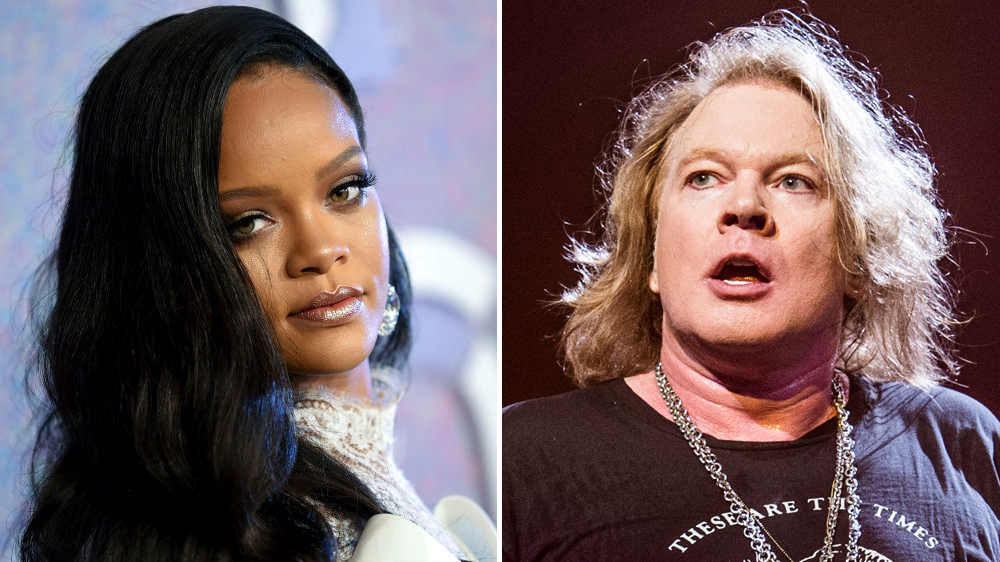Can Rihanna and Axl Rose Order Trump to Stop Playing Their Music at Rallies?
By Jem Aswad
LOS ANGELES (Variety.com) – Long before the political career of Donald Trump began, politicians were using music in their campaign rallies against the artists’ wishes: In 2015, Rolling Stone compiled a list of 35 of them, many dating from the John McCain/Sarah Palin campaign of 2008. Yet the artists’ protestations rarely seem to have any effect, particularly against the current administration: The Rolling Stones have issued multiple requests for Trump to stop using their music during his rallies, and many other artists have complained.
Many, including people in the publishing industry, believe that the songs in question fall under the blanket licenses issued to venues by performing-rights organizations such as ASCAP and BMI, and many campaigns have acted under that assumption as well (if the music is simply played at a rally, and not altered or used in promotional materials by the campaign).
Rihanna and Guns N’ Roses frontman Axl Rose are the latest to complain about Trump’s use of their music in his rallies against their wishes, and Rose went so far as to accuse the campaign of “using loopholes in the various venues’ blanket performance licenses … without the songwriters’ consent.”
However, the artists — at least, artists of a certain stature — do have a recourse, argues Dina LaPolt, attorney for Aerosmith’s Steven Tyler, who succeeded in having the artist’s music removed from Trump’s rallies, and obtained a letter from the campaign’s attorney guaranteeing it.
After the Trump campaign used Aerosmith’s 1993 hit “Livin’ on the Edge” at a rally in West Virginia in August, Tyler sent a cease-and-desist letter through LaPolt to the White House accusing the President of willful infringement in broadcasting the song, which was written by Tyler, Joe Perry and Mark Hudson. LaPolt cited the Lanham Act, which prohibits “any false designation or misleading description or representation of fact … likely to cause confusion … as to the affiliation, connection, or association of such person with another person.” Thus, she contends that playing an Aerosmith song in a public arena gives the false impression that Tyler is endorsing Trump’s presidency. The Lanham Act has taken on enhanced relevance in recent years because footage from major political rallies invariably is posted on the Internet, increasing the implied connection between the political figure and the songs.
The matter came up previously with another Aerosmith song, “Dream On,” which Trump used during his 2015 election campaign. Claiming that “Trump for President needs our client’s express written permission in order to use his music” and that the campaign “was violating Mr. Tyler’s copyright,” BMI pulled the public performance rights for the song.
While public performance rights for “Livin’ on the Edge” are administered by ASCAP, LaPolt says she was aware that the Trump campaign’s performing-rights license expired in 2016, and she directed ASCAP to exclude Tyler’s music from a renewed license; they did so. Thus, the Trump campaign was using the song without a license, and she was able to procure a letter from its attorney pledging not to use any of Tyler’s music at its rallies. To date, it has not done so since the August incident.
LaPolt notes that an artist needn’t wait for a campaign’s license to expire in order to take action, arguing that the Lanham Act should be strong enough.
“If you direct a PRO to withhold licenses for their authors, especially if the writer is big enough, they’ll do it,” LaPolt says.
Another, simpler option is for an artist simply to inform their performing-rights organization that they wish to exclude some or all of their works from use by specific political campaigns. Owing to gaps in the blanket license (and the fact that not all political rallies are held a licensed venues), around 10 years ago, performing-rights organizations ASCAP and BMI created a political-entities license that addresses such issues specifically and includes a provision to have certain songs excluded from the license if an author so wishes. A rep for BMI told Variety, “BMI’s … Political Entities License … covers music use at political campaign events wherever they occur and contains a provision that if a BMI songwriter or publisher objects to the use of a song, we have the ability to exclude that song from the license.”
The PROs would then inform the political campaign of the artist’s request to have the song removed from the license, and that the campaign would be risking infringement claims if it continued to play the song.
Two sources tell Variety that they are not aware of a situation where acting on such an infringement claim became necessary.

